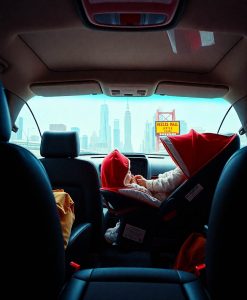Living with small children often feels like a constant balancing act—every trip out the door is a careful choreography of carrying, maneuvering, and orchestrating your little one’s needs. If you’ve ever wrestled with a bulky car seat or struggled to fold up a stroller after a long day, you know the physical toll it can take. Now, imagine if the weight of international tariffs on these essential items suddenly eased, making your daily routines smoother and less stressful.
The news that the U.S. might exempt car seats, strollers, cribs, and other vital child transport items from tariffs on China—some as high as 145%—could have a real impact on families. This potential change isn’t just about economics; it’s about how we move through life with our children, feeling less burdened and more connected during those important moments of family life.
When I think about how tariff costs ripple through to families, I picture the tangible weight of these tariffs—costs that can add up and make already hefty purchases feel even more burdensome. For parents, especially those navigating the early years of parenthood, every dollar counts. The possibility of reducing the financial strain on essential baby gear like car seats and strollers could mean more room in the budget for other important needs—like nutritious food, healthcare, or even taking a little extra time to enjoy a walk or a quick outing.
This potential exemption also whispers a message of reassurance. It says that the government recognizes how fundamental these items are for safety and everyday life. A sturdy, reliable car seat isn’t just a convenience—it’s a safeguard that keeps a child secure during car rides. A well-designed stroller isn’t just a mode of transport; it’s a small sanctuary for a tired little one, and a tool that grants parents the freedom to move, explore, and connect with the world outside.
For parents and caregivers, the daily challenge is often about maintaining a sense of calm amid chaos. When the cost of essential gear drops, it’s like lifting a small weight off your shoulders, making it easier to focus on the moments that truly matter—listening to your child’s giggles, navigating the busy streets, or simply feeling a little less overwhelmed by the logistics of family life.
What does this mean for your everyday experience? It could translate into more affordable, accessible options for safe, reliable gear. It might mean more choices in the market—products that are better suited to your needs because manufacturers can keep costs manageable. And it could help foster a sense of stability, knowing that your ability to care for your child isn’t as vulnerable to sudden price hikes caused by international trade policies.
The idea of tariffs on domestic essentials has always created a quiet undercurrent of concern—what happens when the costs of the essentials we rely on increase unexpectedly? As families, we navigate these economic shifts with resilience, but it’s comforting to believe that policies are shifting to support us, not burden us further.

In the end, this potential tariff exemption is about more than just economics; it’s about recognizing what it means to care for a child in a world where safety, comfort, and ease are fundamental. It’s about making sure that every parent can focus on what truly matters—those fleeting moments of joy, discovery, and connection—not on how much it costs to get out the door.
Learn More: US May Exempt Car Seats, Strollers From China Tariffs
Abstract: The Trump administration is considering exempting car seats, baby strollers, cribs and other essential items for transporting children from tariffs on China up to 145%, Treasury Secretary Scott Bessent said Wednesday.
Link: Read Full Article (External Site)
